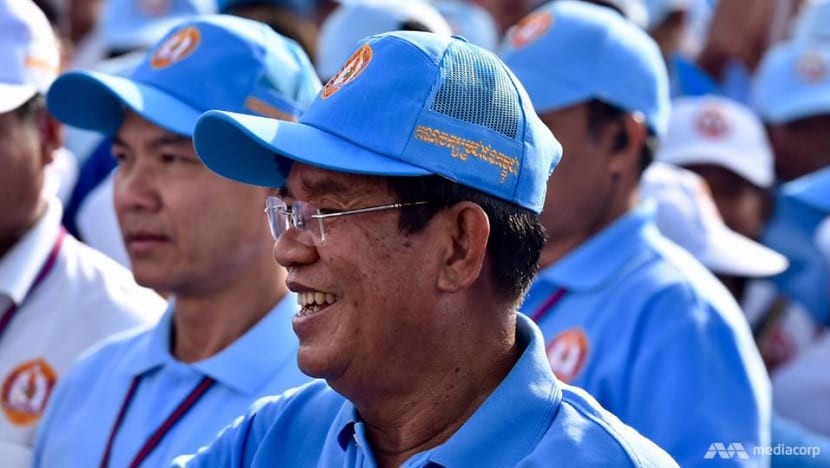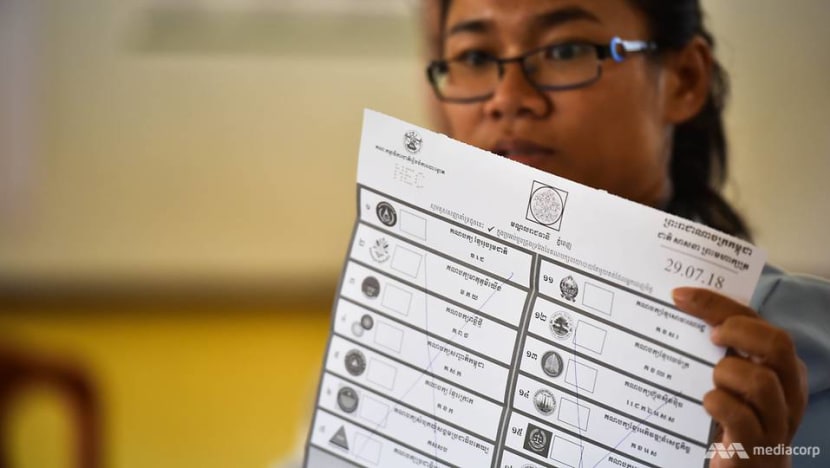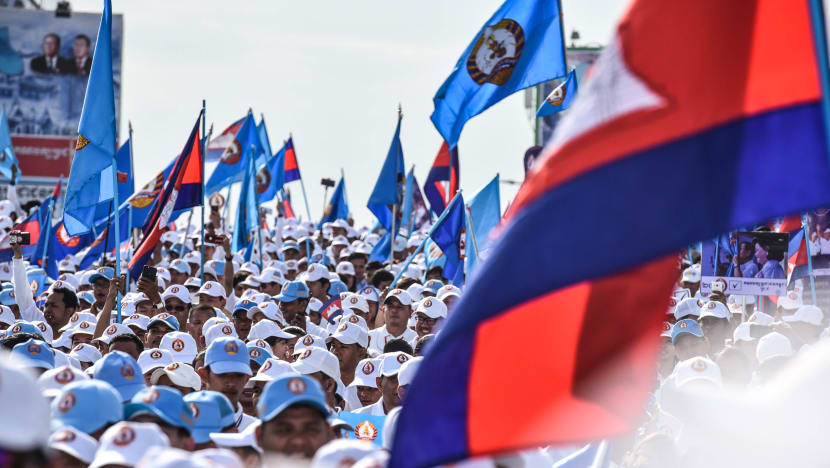Hun Sen’s full house: Ruling party claims it has won every seat in Cambodia election

Prime Minister Hun Sen at the CPP rally on Friday (Jul 27). (Photo: Jack Board)
PHNOM PENH: Cambodia’s next parliament looks set to consist only of members of Prime Minister Hun Sen’s ruling party after it said that it swept all 125 seats being contested in the general election on Sunday (Jul 29).
While the National Election Committee (NEC) has yet to confirm the final outcome, the Cambodian People’s Party’s (CPP) on Monday claimed its own complete domination, less than 24 hours after the polls closed in a vote widely condemned by international observers.
If confirmed, the absolute victory will have ended multi-party democracy in the country on a legislative level, leaving just one party to dominate political and social affairs for at least the next half decade.
The CPP claimed 77 per cent of the popular vote, comprehensively crushing its smaller, ill-equipped rivals. The now largely irrelevant royalist party Funcinpec, once a genuine player in Cambodian politics, was the next best with 5.76 per cent of the vote.
The second most popular option for voters was to invalidate their vote. There was a significant number of spoiled votes across the country but particularly in urban areas - as high as 17 per cent in Phnom Penh, based on preliminary votes - a likely indicator of a silent protest by hundreds of thousands of voters.
Channel NewsAsia witnessed dozens of ballot papers with large crosses through them or all boxes crossed. And in contrast, only 1.6 percent of votes were deemed invalid in 2013.

"I can say we overwhelmingly dominated the seats in the National Assembly,” said Sok Eysan, the CPP’s spokesman.
It was the creation of new party laws that culminated in the arrest of opposition leader Kem Sokha and the subsequent systematic dissolution of the party he led and which previously had genuine ambitions of winning this election.
The Cambodia National Rescue Party (CNRP) had already boycotted much of the previous term of the National Assembly, claiming its members had been targeted and harassed.
Two of its outspoken self-exiled members, deputy Mu Sochua and Kem Monovithya, called on the full rejection of the result by the international community, including regional countries within ASEAN.
“July 29, 2018 marked the death of democracy in Cambodia, a dark new day in recent history,” Sochua said.
The United States said it would consider a “significant expansion” of visa restrictions on Cambodia’s political elite, according to a statement released by the White House.
“The United States regrets...that the elections were neither free nor fair and failed to reflect the will of the Cambodian people. We are profoundly disappointed in the government’s choice to disenfranchise millions of voters,” the statement read.
The Australian government expressed its “serious concerns” about the vote, saying it had “reversed more than 25 years of progress towards democracy in Cambodia”.
Monovithya told Channel NewsAsia watching the election “circus” from afar was the “saddest day” of her life.
She added that she believed the government had “fabricated” voting turnout figures that showed about 82 per cent of registered voters had participated, a considerably higher figure than the highly contested election in 2013.
She applauded those who had heeded the opposition’s calls to abstain from the vote, although those numbers were not significant amid strong pressure and incentives by authorities for people to participate.

Both the CPP and NEC refuted all claims that any aspects of the vote had been manipulated or forced, and rejected the conclusions of the US and others.
“Cambodia should be proud,” said NEC chairman Sik Bun Hok. “It showed the maturity of Cambodian people all over the country. They know how to use their rights and how to choose their leader.”
A news conference with international observers on Monday offered a united front that the process was transparent, inclusive and professional. But the impartiality and expertise of those observers has been questioned.
In addition to loud headlines trumpeting the victory in pro-government media outlets, a lengthy video released by the government's press arm following the vote compared the situation in 2018 to five years ago, where mass demonstrations broke out sparked by opposition calls that the result was rigged.
It included warnings to the people about trouble-making drug addicts, violent-trained protesters, networks of colour revolution agents and the “extremist convict” former opposition leader Sam Rainsy.
There was no risk of anything threatening state-imposed order this year as the government took steps to silence its critics.














